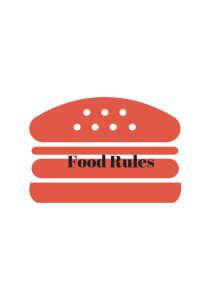Do you have food rules? You know the ones you tell yourself you need to follow, so you can be “good”. A lot of people I have met have some type of food rule. You may see these food rules as a way to keep yourself from overeating or gaining weight.
Food rules are frustrating/ineffective, because they are hard to follow and they do not work over the long term.
Some food rules I have heard are:
- No candy or chocolate in the house.
This rule is used to help you not eat sweets, because you have the idea sweets are bad.
- No eating after 8pm, even if you are hungry.
This rule is used to help you not eat in the nighttime for fear of gaining weight or overeating.
- Refrigerator that has minimal food except diet food.
This rule helps you not have tempting food in the house with the idea that if there is no tempting food around you will not overeat.
- Hide any candy wrappers or evidence that you ate something “bad.”
This rule helps you forget what you ate to avoid remorse or punishment for overeating.
- Eat as if you’re on a diet in front of others and binge in private.
This food rule makes you think you are on track and gives others that illusion so that they can tell you how little they see you eat.
- Eat fast food in your car while you are driving.
This food rule helps you be distracted when eating, so you might forget what you ate and not feel bad about it. It is also an unsafe driving habit.
- Anytime you eat a forbidden food you need to exercise.
This rule sets up the idea that when you eat you have to exercise. This puts exercise as connected to food and makes you, in the end, only exercise when on a diet, not as a normal part of life.
- I am allowed to eat comfort foods when I am under stress.
This rule allows you to eat when stressed and for some of us that is often. This takes away the normal use of hunger as the tool to determine when you eat.
Do some of these fit you? Don’t worry -you are not alone. Relating to these food rules can be a starting spot for you to see if something is not working in your relationship with food.
Often food rules are thought of as a way to avoid overeating. But do they really help you avoid overeating? I have found that they actually are the precursor to overeating: Engaging in food rules feels like deprivation, which is the starting spot to overeating. Once you tell yourself you cannot have a certain food, it starts a process where a part of your mind says “you cannot tell me what to do.” That rebel side will lead you to overeat when times get tough, when life gets hard.
I encourage you to look at your own food rules and see if they set you up to overeat. If they are the precursor to your overeating, reexamine if you still want them as a rule.
Identifying and owning your food rules is the start to letting them go. Let us know your food rules in the comments section.
Kim McLaughlin, MA is a Counselor and Motivational Coach who specializes in working with people who suffer from binge eating and emotional eating. She is a Certified Intuitive Eating Counselor.
Kim McLaughlin has been identified as writing one of the Top 50 Blogs about Emotional Eating by the Institute on Emotional Eating. Sign up for her free Special Report: Top Strategies to End Binge Eating here or visit her website at www.FeedYourSoulUnlimited.com. You can schedule a Free Breakthrough Strategy Session here.



This is the best advice I have ever seen on one of these sites. It’s the only reitaslic way to psychologically fix this problem. Many people want a quick fix and they think that eating whatever they want will only make them eat more. WRONG. Don’t think about what you eat and you will fight your disorder and most likely maintain a healthy weight eventually.
You are right a quick fix is not the way to go. Thanks for reading. Kim